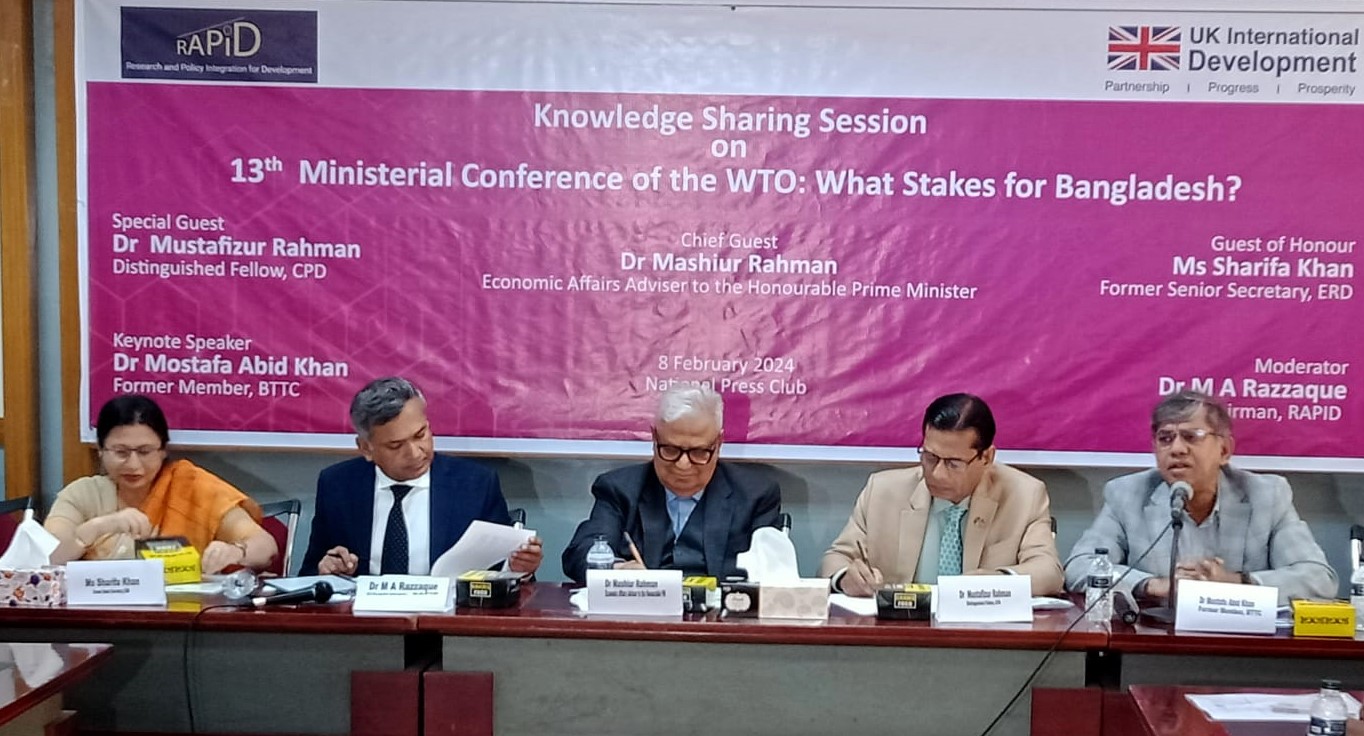
DHAKA, Feb 08, 2024 (BSS) - Economists and experts today suggested that Bangladesh should negotiate issues related to trade benefits in the 13th Ministerial Conference (MC13) of the World Trade Organization (WTO) to be held from February 26 to 29 in Abu Dhabi.
They made this suggestion at a knowledge-sharing session on '13th Ministerial Conference of the WTO: What Stakes for Bangladesh?' held at the National Press Club in the city.
The economists opined that Bangladesh should negotiate not as a least developed country (LDC) but as a future non-LDC developing country in an aim to make the graduation sustainable.
They also observed that at the upcoming MC13, the LDC should advocate for extending trade benefits for graduating LDCs.
A local think tank - Research and Policy Integration for Development (RAPID) -with the support from the Foreign, Commonwealth and Development Office of the United Kingdom organized the programme.
Prime Minister's Economic Affairs Adviser Dr Mashiur Rahman attended the programme as chief guest while former Senior Secretary Sharifa Khan, Centre for Policy Dialogue (CPD) Distinguished Fellow Mustafizur Rahman, trade policy analyst Mostafa Abid Khan, RAPID chairman M A Razzaque, head of online, Prothom Alo, Shawkat Hossain Masum and the Financial Express Planning Editor Asjadul Kibria spoke at the event.
Experts in the event mentioned that WTO members would have differing priority issues for MC13.
Securing an agreement on fisheries subsidies negotiation, embarking on border reforms and dysfunctional dispute settlement system would be the key issues in the conference, they informed.
In his speech, Dr Mashiur Rahman laid emphasis on increasing export of high value-added products so that Bangladesh can face smoothly the challenges after LDC graduation.
Under the leadership of Prime Minister Sheikh Hasina, he said, the government has already taken many measures to face challenges after the graduation.
Mustafizur Rahman said that Bangladesh would have to keep in mind the interest of the developing countries during the negotiation in the WTO.
He said that Bangladesh would have to take preparation for some reforms as the country would graduate in November 2026.
Bangladesh should go for reverse engineering which could allow the country to use the formula without paying any charge, Mustafiz said.
Sharifa Khan said that after the LDC graduation, Bangladesh would enjoy duty-free market access up to 2029 and after then the country would not get duty-free market access in the European countries.
For availing duty free access, the country would have to apply with the European Union and implement 32 international conventions, including human rights and rules of law, she said.
'Bangladesh has signed all the conventions but there are some problems in implementation. After fulfilling all the conditions, there was a question whether the RMG would get duty-free market access,' Sharifa said.
She also said that Bangladesh should go for reverse engineering for using patent licenses without any fee in producing pharmaceuticals even after LDC graduation.
"It is likely that many issues will remain unresolved in MC13 as divergent views among various member states on a multitude of issues have made reaching a consensus challenging," M A Razzaque said.
He suggested that Bangladesh should play a proactive role using the MC13 platform and making its contribution to revive multilateralism.
RAPID Executive Director Dr Abu M Yousuf also spoke on the occasion.